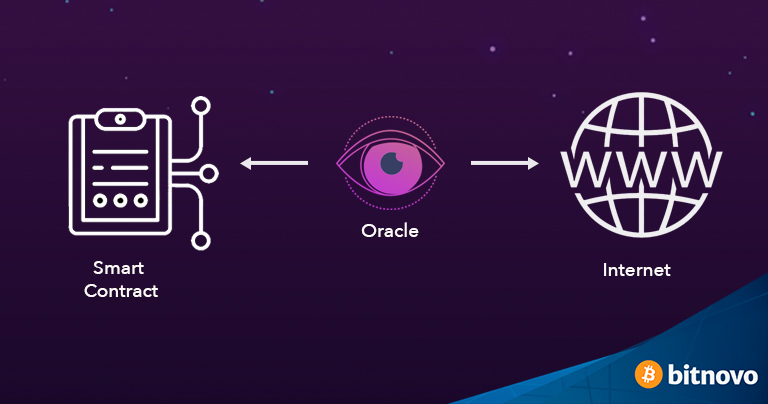What Is A Blockchain Oracle And How Does It Work?

Blockchain oracles are third-party services that provide smart contracts with access to external data and information. They act as intermediaries between the decentralized world of blockchains and the real world, enabling smart contracts to react to real-time events and information from off-chain sources.
Why are blockchain oracles important?
Blockchain oracles are essential for expanding the capabilities and use cases of smart contracts. Without oracles, smart contracts would be confined to the on-chain data generated within the blockchain network, limiting their ability to interact with the outside world and respond to real-world conditions.
Here are some specific examples of how blockchain oracles are being used:
Decentralized finance (DeFi): Oracles are used to provide price feeds for assets like cryptocurrencies and traditional stocks, enabling the execution of decentralized financial contracts based on real-time market data.
Supply chain management: Oracles can track the movement of goods and materials throughout the supply chain, providing transparency and traceability for supply chain participants.
Predictive markets: Oracles can gather data from various sources to inform predictions about future events, such as election outcomes or sports matches.
Insurance: Oracles can provide real-time data on weather conditions, flight delays, or other relevant factors to trigger insurance payouts in case of certain events.
Types of blockchain oracles
Centralized oracles: These oracles are controlled by a single entity or group of entities, which can raise concerns about trust and reliability.
Decentralized oracles (DONs): These oracles are distributed across multiple nodes, making them more resistant to manipulation and censorship. DONs are considered more secure and reliable than centralized oracles.
How do blockchain oracles work?
The specific process of how blockchain oracles work varies depending on the implementation, but the general steps involved are as follows:
Data acquisition: The oracle gathers data from external sources, such as APIs, sensors, or third-party data providers.
Data verification: The oracle verifies the accuracy and authenticity of the data before submitting it to the blockchain.
Data reporting: The oracle sends the verified data to the smart contract or other blockchain application that requires it.
Smart contract execution: The smart contract executes based on the received data, triggering actions or calculations as programmed.
Challenges and future of blockchain oracles
Blockchain oracles face several challenges, including:
Security: Ensuring the tamper-proofness and reliability of data sources and oracle networks.
Scalability: Supporting the growing demand for oracle services without sacrificing performance or decentralization.
Data privacy: Protecting sensitive data and ensuring compliance with privacy regulations.
Despite these challenges, blockchain oracles are an essential component of the evolving blockchain ecosystem. As the technology matures and new solutions are developed, blockchain oracles are poised to play an increasingly crucial role in enabling smart contracts to interact with the real world in a secure, reliable, and scalable manner.
Blockchain oracle problem
The blockchain oracle problem refers to the challenge of securely and reliably providing real-world data to smart contracts on a blockchain. Smart contracts are self-executing contracts that are stored on a blockchain and can be used to automate a variety of tasks, such as financial transactions or supply chain management. However, smart contracts cannot directly access data from the outside world, so they rely on oracles to provide them with this information.
Oracles are third-party entities that act as intermediaries between the blockchain and the outside world. They fetch data from external sources, such as APIs or sensors, and then provide it to smart contracts. However, oracles introduce a number of risks, including:
- Centralization: Oracles are often centralized, which means that they are controlled by a single entity. This can introduce a single point of failure and make it possible for malicious actors to manipulate data.
- Trust: Oracles need to be trusted to provide accurate and reliable data. However, it can be difficult to establish trust with oracles, as they are often opaque and their processes are not transparent.
- Data integrity: The data provided by oracles needs to be accurate and tamper-proof. However, it can be difficult to ensure data integrity, as oracles may be susceptible to manipulation or errors.
The blockchain oracle problem is a critical challenge that needs to be addressed in order for smart contracts to reach their full potential. A number of solutions have been proposed to address the problem, including:
- Decentralized oracles: Decentralized oracles use a network of nodes to provide data, which can help to reduce the risk of centralization and manipulation.
- Reputational oracles: Reputational oracles use a reputation system to identify and reward trustworthy oracles.
- Secure multi-party computation (SMPC): SMPC is a technique that allows multiple parties to compute a function without revealing their inputs to each other. This can be used to ensure the privacy and integrity of oracle data.
The development of secure and reliable oracle solutions is essential for the continued growth of the smart contract ecosystem.
What do blockchain oracles do?
Blockchain oracles are critical components of the blockchain ecosystem, serving as bridges between the decentralized world of blockchains and the external, real-world data sources. They provide smart contracts with access to off-chain data, enabling them to react to real-world events and execute based on external information.
Here’s a summary of the key functions of blockchain oracles:
Data Provision: Blockchain oracles fetch and verify data from external sources, such as weather data, sports results, or financial market prices.
Trusted Data Aggregation: Oracles collect data from multiple sources and aggregate it to ensure data integrity and consensus. This helps reduce the risk of manipulation or false information.
Smart Contract Execution: Oracles deliver the verified data to smart contracts, triggering their execution based on predefined conditions. For instance, a smart contract for an insurance policy might use oracle data to verify a claim and automatically release funds.
Real-World Interaction: Oracles enable smart contracts to interact with the physical world through actuators or APIs. For example, an oracle could receive data from a sensor and trigger a smart contract to adjust a thermostat or activate a security system.
Decentralized Oracle Networks (DONs): DONs are emerging as a more secure and reliable alternative to centralized oracles. They leverage multiple nodes to collect and verify data, enhancing data integrity and reducing the risk of single points of failure.
In essence, blockchain oracles play a crucial role in expanding the capabilities of smart contracts, enabling them to respond to real-world events, interact with external systems, and automate various processes in a decentralized and secure manner.
Types of blockchain oracles
Blockchain oracles are essential components of the blockchain ecosystem, serving as bridges between real-world data and decentralized applications (DApps) running on blockchains. They play a crucial role in providing smart contracts with access to off-chain information, enabling them to execute based on real-world conditions.
There are various types of blockchain oracles, each with its own characteristics and use cases. Here’s a comprehensive overview of the different types of blockchain oracles:
1. Inbound Oracles vs. Outbound Oracles:
Inbound oracles primarily focus on bringing external data into the blockchain environment. They gather information from various sources, such as APIs, web services, or sensors, and deliver it to smart contracts for execution.
Outbound oracles, on the contrary, transmit data from the blockchain to external systems. They enable smart contracts to send information to off-chain applications, triggering actions or updates based on on-chain events.
2. Software Oracles vs. Hardware Oracles:
Software oracles retrieve data from digital sources, such as APIs, databases, and websites. They are often used in conjunction with inbound oracles to provide smart contracts with real-time market data, weather updates, or social media sentiment analysis.
Hardware oracles, on the other hand, gather information from physical devices, such as sensors, IoT (Internet of Things) devices, or RFID tags. They are particularly useful for applications that require real-time monitoring of physical assets or environmental conditions.
3. Centralized Oracles vs. Decentralized Oracles:
Centralized oracles rely on a single trusted source for their data feeds. While they can be efficient and cost-effective, they introduce a single point of failure and potential manipulation risks.
Decentralized oracles, in contrast, utilize multiple independent sources and consensus mechanisms to validate data. They aim to provide a more secure and tamper-proof solution, but they may require more complex setups and incur higher costs.
4. Contract-Specific Oracles:
Contract-specific oracles are designed to serve the specific data needs of a particular smart contract. They are tailored to the unique requirements of the application and may employ specialized data sources or consensus mechanisms.
5. Human Oracles:
Human oracles involve human judgment and intervention in the data collection and validation process. They are typically used in situations where automated oracles cannot provide accurate or reliable information, such as subjective assessments or legal interpretations.
The choice of oracle type depends on the specific requirements of the application, considering factors such as data sources, security, decentralization, and cost-efficiency. Inbound oracles are commonly used for DeFi applications, while hardware oracles are suitable for IoT-based solutions. Centralized oracles may be used in early stages of development, while decentralized oracles are preferred for production environments. Contract-specific oracles are tailored to specific smart contracts, and human oracles are employed when automated solutions are insufficient.
ALSO READ: What Are Blue-chip Nfts, And How To Find Them?
Blockchain oracles are continuously evolving, with new innovations and developments emerging to address the challenges and expand the capabilities of this critical infrastructure. As the blockchain ecosystem matures, oracles will play an increasingly important role in enabling smart contracts to interact seamlessly with the real world, driving the adoption and expansion of decentralized applications.
Hardware and software oracles
In the context of computer science, an oracle is a hypothetical entity that can provide perfect information about a specific problem. This information can be used to solve the problem in the most efficient way possible. Oracles are often used in theoretical computer science to prove the existence of efficient algorithms for certain problems.
There are two types of oracles: hardware oracles and software oracles. Hardware oracles are physical devices that can provide information about the physical world. For example, a thermometer is a hardware oracle that can provide information about the temperature of a room. Software oracles are programs that can provide information about the state of a computer system. For example, a system monitor is a software oracle that can provide information about the CPU usage of a computer.
Oracles are a powerful tool for solving problems in computer science. However, they are also a theoretical concept and do not exist in practice. In the real world, we must make do with imperfect information.
Inbound and outbound oracles
In the context of blockchain technology, oracles are crucial components that bridge the gap between the decentralized, secure world of blockchains and the real-world data and events that are essential for many smart contract applications. They act as trusted intermediaries, fetching and verifying information from external sources and providing it to smart contracts on the blockchain.
Inbound oracles and outbound oracles are two distinct types of oracles that play different roles in facilitating data exchange between blockchains and the external world.
Inbound Oracles:
Inbound oracles are responsible for bringing real-world data into the blockchain ecosystem. They gather information from various external sources, such as APIs, sensors, or human inputs, and relay it to smart contracts. This data can be used to trigger smart contract execution, automate payments, or provide real-time information for decentralized applications (DApps).
Common examples of inbound oracles include:
Price oracles: These oracles fetch real-time market prices for assets like cryptocurrencies, commodities, or stocks, enabling smart contracts to execute trades or adjust parameters based on price fluctuations.
Weather oracles: Weather oracles gather weather data from various sources, such as meteorological stations or weather APIs, providing smart contracts with accurate weather information to trigger insurance payouts or adjust agricultural operations.
Result oracles: These oracles retrieve outcomes of real-world events, such as sports matches or elections, allowing smart contracts to distribute winnings or execute actions based on the results.
Outbound Oracles:
Outbound oracles, on the other hand, facilitate the flow of information from the blockchain to the external world. They receive data generated by smart contract executions and transmit it to external systems, such as databases, IoT devices, or notification services. This enables smart contracts to interact with the real world and trigger actions beyond the blockchain.
Examples of outbound oracles include:
Payment oracles: These oracles receive payment instructions from smart contracts and initiate payments to external payment processors or beneficiaries.
Data logging oracles: Outbound data logging oracles receive data generated by smart contracts and store it in external databases or data warehouses, enabling long-term data storage and analysis.
Notification oracles: These oracles receive event notifications from smart contracts and send alerts or updates to external systems, such as email or SMS notification services.
The interplay between inbound and outbound oracles is crucial for enabling a seamless flow of information between blockchains and the real world. Inbound oracles provide smart contracts with the real-time data they need to function effectively, while outbound oracles allow smart contracts to interact with external systems and trigger real-world actions. As blockchain technology continues to evolve, the role of oracles will become increasingly important in bridging the gap between the blockchain and the physical world, enabling a wide range of innovative applications and services.
Applications of oracles in DApps
Oracles play a crucial role in decentralized applications (DApps) by bridging the gap between the blockchain and the real world. They provide DApps with access to external data and events, enabling them to interact with off-chain systems and incorporate real-world information into their operations.
key applications of oracles in DApps
Price Feeds: Oracles are used to provide DApps with real-time price feeds for various assets, such as cryptocurrencies, commodities, and stocks. This data is essential for decentralized exchanges (DEXs) to facilitate trading and for insurance protocols to calculate premiums and payouts.
Random Number Generation (RNG): Oracles can generate secure and verifiable random numbers for DApps, which are critical for various applications such as gaming, decentralized lotteries, and blockchain-based identity systems.
Data Verification: Oracles can verify the authenticity and integrity of off-chain data, such as weather data, flight information, or sports results. This verified data can then be used by DApps to trigger smart contract actions or inform decision-making processes.
Event Tracking: Oracles can monitor and report on real-world events, such as flight delays, weather updates, or news announcements. This event data can be used by DApps to trigger automated actions or provide users with real-time insights.
Identity Verification: Oracles can verify the identity of users or entities, enabling DApps to implement access control mechanisms and ensure compliance with regulations.
Data Aggregation and Analysis: Oracles can aggregate and analyze data from various sources, providing DApps with comprehensive insights into market trends, user behavior, or real-world conditions.
Decentralized Governance: Oracles can facilitate decentralized governance by enabling token holders to vote on proposals and make decisions that affect the development and operation of DApps.
Cross-Chain Communication: Oracles can enable communication between different blockchains, allowing DApps to exchange data and assets across different networks.
Predictive Analytics: Oracles can provide DApps with access to predictive analytics models, enabling them to forecast future events or trends based on historical data and real-time information.
Compliance and Regulatory Enforcement: Oracles can help DApps comply with regulatory requirements by providing verifiable proof of adherence to specific rules or standards.
As DApps continue to evolve and expand in scope, oracles will play an increasingly important role in connecting these applications to the real world and enabling them to function effectively in a decentralized ecosystem.
In Conclusion:
oracles are a critical component in the development and success of decentralized applications. They bridge the gap between the blockchain world and the real world by providing external data and ensuring compliance with regulations. As the demand for DApps grows and their use cases become more diverse, oracles will continue to be essential in enabling these applications to operate seamlessly and securely. With advancements in technology and the increasing adoption of blockchain, we can expect oracles to become even more sophisticated and reliable in the future.







